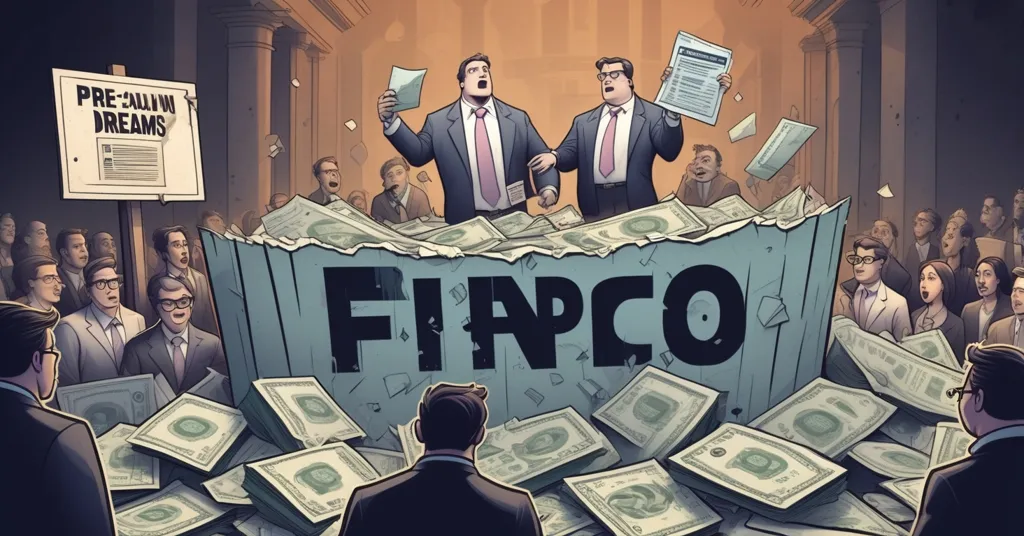Ripple CTO Exposes Pre-IPO Share Truth Amid Linqto’s Fraud-Fueled Collapse

Ripple CTO Drops Bombshell on Pre-IPO Shares as Linqto Meltdown Explodes
A staggering collapse has rocked Linqto, a platform that dangled the dream of pre-IPO stakes in blockchain heavyweights like Ripple, only to leave 13,000 investors stranded in a regulatory quagmire. Federal investigations by the SEC and DOJ, allegations of fraud, frozen accounts, and the specter of bankruptcy have turned this once-hyped fintech darling into a cautionary tale for crypto enthusiasts and retail investors alike.
- Linqto Implosion: Under SEC and DOJ scrutiny for securities violations, with Chapter 11 bankruptcy looming.
- Investor Fallout: 13,000 users impacted, accounts frozen since February, holdings in jeopardy.
- Ripple Share Reality: Ripple CTO David Schwartz reveals investors own fractions of SPVs, not direct shares.
Linqto’s House of Cards: Fraud Allegations and Frozen Funds
Linqto pitched itself as a gateway to pre-IPO gold, promising everyday investors a slice of high-profile blockchain firms like Ripple before they hit public markets. The allure was potent—get in early on a potential crypto titan. But beneath the glossy marketing lay a cesspool of alleged misconduct. Former CEO William Sarris stands accused of inflating Ripple share prices by more than 60%, selling client stock without consent, and aggressively targeting non-accredited investors—those who, per SEC rules, don’t meet the income or net worth thresholds (typically $200,000 annual income or $1 million net worth) to dabble in such high-risk ventures. Of Linqto’s 13,000 customers, roughly 11,500 invested in structures tied to Ripple shares, and a staggering 5,000 of them were non-accredited, a clear violation of securities laws meant to shield retail players from catastrophic losses.
The situation unraveled when client accounts were frozen in February, locking investors out of their funds with zero clarity on when—or if—they’d regain access. On March 14, Linqto’s new management dropped a bombshell press release, admitting to “pervasive securities-law violations.” They halted all trading, axed nearly half the staff, and flagged a possible Chapter 11 bankruptcy filing. If that happens, investors could be relegated to unsecured creditors—meaning they’re at the bottom of the payback ladder, likely recovering pennies, if anything, after legal fees and prioritized debts eat up whatever’s left. Internal emails reportedly expose executives pushing predatory sales tactics, including buying Ripple shares from clients at $55 and reselling them to Ripple at $61, pocketing an $8 million spread. If proven, this isn’t just bad business—it’s a outright betrayal of trust.
Unpacking the SPV Maze: What Do Investors Actually Own?
At the heart of this mess is how Linqto structured its investments. To manage risk and dodge regulatory hurdles, the platform created over 500 special-purpose vehicles (SPVs)—legal entities that pool investor money to hold assets like private company shares. Think of it as a group of friends pooling cash to buy a rental property; you don’t own the house outright, just a slice of the group that does. In this case, SPVs kept Ripple’s shareholder count below the SEC’s 2,000-person threshold, which triggers mandatory public financial disclosures. Clever on paper, disastrous in practice.
Ripple’s Chief Technology Officer, David Schwartz, known in crypto circles as JoelKatz, stepped in to clarify the ownership structure with a reality check that’s anything but comforting.
“You don’t own the shares directly, but you own a portion of a legal entity that owns the shares.”
In other words, Linqto investors don’t hold Ripple stock—they hold fractions of these SPVs that do. Schwartz offered a sliver of hope on bankruptcy risks, suggesting the SPVs shouldn’t be directly tied to Linqto’s debts, but he couldn’t resist a sobering caveat as detailed in his explanation of the SPV structure:
“The legal entity that owns the shares that you own part of should not have exposure to Linqto going bankrupt. So a direct encumbrance on the shares to cover Linqto’s debts shouldn’t happen. But the entity may face operational challenges depending on exactly how it’s structured.”
Translation: your investment might not be seized outright to pay Linqto’s creditors, but don’t count on smooth sailing. Operational challenges could mean delayed asset distribution, legal battles over title to nearly half a billion dollars in private shares, or trustee mismanagement draining value through fees. Liquidity? That’s a pipe dream for now.
Regulatory Reckoning: A Compliance Disaster
The regulatory fallout is where this saga gets even uglier. The SEC and DOJ are circling Linqto, with enforcement actions almost certainly on the horizon. The core issue? Allowing up to 5,000 non-accredited investors into a high-risk game they were never meant to play. Securities laws exist to protect the average person from speculative bets that could wipe out their savings, and Linqto’s flagrant disregard has turned this into what attorney and crypto advocate John E. Deaton aptly described as a:
“Total clusterfuck.”
Deaton didn’t hold back, calling the involvement of non-accredited investors:
“A regulatory compliance nightmare.”
He’s right. This isn’t just a slap on the wrist waiting to happen—it’s a full-blown crackdown. Deaton’s planning a live session to dissect the mess, and you can bet thousands of affected investors are hanging on for any shred of hope or legal recourse. Beyond the immediate victims, this scandal signals a broader SEC push to rein in fintech and crypto-adjacent platforms exploiting retail fervor, especially after the 2020-2021 bull run lured hordes of newcomers into unvetted schemes. For more on navigating these complex SEC regulations for pre-IPO investments, it’s worth understanding the rules that Linqto seemingly ignored.
Ripple’s Shadow: Guilt by Association?
Let’s be clear: Ripple itself isn’t accused of wrongdoing in Linqto’s collapse. The blockchain company, known for its XRP token and cross-border payment solutions via RippleNet, is merely the shiny object Linqto dangled before investors. Yet, the association doesn’t help Ripple’s image, already tarnished by its own ongoing SEC lawsuit alleging XRP is an unregistered security. Pre-IPO hype around Ripple has long been fueled by milestones like partnerships with major financial institutions and speculation of a public listing, but regulatory overhang and scandals like this could dampen retail sentiment or delay any IPO plans. As for XRP’s price, while some reports tied to this saga cited $2.20, current data pegs it around $0.50–$0.60 as of late 2023. No clear correlation to Linqto’s woes exists, but the discrepancy underscores the need for vigilance on market noise versus reality. Community discussions on platforms like Reddit highlight the impact on Ripple pre-IPO investors caught in this mess.
Conspiracy Sidetrack: The Soros Red Herring
For the rumor mill enthusiasts, speculation about billionaire investor George Soros linking to Ripple through PolySign—a separate crypto custody and fund administration outfit Linqto users also invested in—gained some traction. Schwartz shut it down fast:
“Soros’ fund did invest in PolySign to help finance the acquisition of MG Stover! No connection to Ripple AFAICT though.”
To clarify, Soros Fund Management backed PolySign in 2022 for its purchase of MG Stover, a fund administrator. It’s a distinct entity from Ripple, and chasing this ghost distracts from the real issues at hand—Linqto’s alleged fraud and the investor carnage left behind. Crypto’s penchant for conspiracy often overshadows hard facts; let’s not fall into that trap.
Historical Echoes and Systemic Risks
Zooming out, Linqto’s debacle isn’t an isolated incident. Pre-IPO investing has historically been a playground for the ultra-wealthy and institutional sharks who can stomach illiquidity and wipeouts. Opening that door to retail investors, especially non-accredited ones, mirrors past disasters where hype outpaced due diligence. Think BitConnect or OneCoin in the crypto sphere, or Theranos in tech—schemes that peddled dreams to the masses, only to collapse under fraud and mismanagement. Linqto’s alleged 60% markups and unauthorized sales aren’t just bad optics; they’re a masterclass in exploiting retail FOMO (fear of missing out), a recurring plague in blockchain-related investments where the promise of “the next Bitcoin” clouds judgment. For deeper insights into the unfolding SEC and DOJ investigation into Linqto, the scope of the allegations continues to grow.
The SEC’s likely hammer drop on Linqto reflects a broader clampdown on such platforms, a trend gaining steam since the crypto boom saw inexperienced investors flood in. But here’s a harsh truth: regulation alone won’t save everyone. Retail investors must learn that “democratized access” often means you’re the one shouldering the risk while middlemen cash out. How many more centralized platforms need to implode before the lesson sticks? Community reactions on Reddit about Linqto’s bankruptcy impact reveal the frustration and uncertainty among the 13,000 affected investors.
Key Questions and Takeaways on the Linqto Crisis
- What sparked Linqto’s collapse and the federal investigations?
Allegations against former CEO William Sarris for inflating Ripple share prices by over 60%, selling client stock without consent, and targeting non-accredited investors triggered SEC and DOJ probes, worsened by admitted securities violations and a potential bankruptcy. - How are Linqto investors affected by this disaster?
Around 13,000 users have had accounts frozen since February, face potential total loss as unsecured creditors in a bankruptcy scenario, and grapple with uncertainty over indirect holdings in Ripple via SPVs. - Do Linqto clients directly own Ripple shares?
No, as David Schwartz explained, they own portions of SPVs that hold the shares, not the shares themselves, creating legal and operational hurdles to recovering any value. - What regulatory violations are central to this mess?
Allowing up to 5,000 non-accredited investors into high-risk pre-IPO deals breaks SEC rules designed to protect retail players, setting the stage for significant enforcement actions. - Could decentralized systems offer a better path for crypto investing?
Potentially—blockchain-based platforms for tokenized assets could cut out shady intermediaries like Linqto with transparency and autonomy, though regulatory friction remains a hurdle in today’s environment.
A Call for Decentralized Disruption
For those of us championing decentralization, privacy, and the raw potential of Bitcoin to upend finance, Linqto’s centralized implosion is both a gut punch and a rallying cry. Why trust flawed middlemen when blockchain tech offers alternatives? Projects like tZERO or Polymath, which aim to tokenize securities on transparent, immutable ledgers, hint at a future where ownership isn’t obscured by SPV labyrinths or subject to a CEO’s whims. Sure, these systems aren’t perfect—regulatory gray zones and scalability issues persist—but they align with the ethos of cutting out unaccountable gatekeepers. Call it effective accelerationism: push for disruptive tech adoption, even if the path is messy, because the status quo of centralized greed keeps failing spectacularly.
Linqto’s fate hangs on restructuring efforts, the weight of SEC and DOJ actions, and whether SPV trustees can untangle half a billion dollars in private shares. Investors, meanwhile, are learning a brutal lesson—hype isn’t a strategy, and blind trust in platforms waving a crypto flag is a one-way ticket to pain. Ripple might weather this storm unscathed legally, but the reputational ripple effect lingers. For the broader crypto space, this fiasco begs a critical question: how many more centralized disasters will it take before we double down on trustless, blockchain-native solutions? Keep your wits sharp—this revolution rewards the skeptical, not the starry-eyed. If you’re curious about broader perspectives on what happened to Linqto investors with Ripple holdings, online forums are buzzing with debate.



